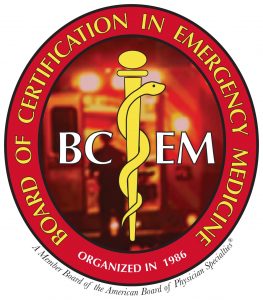Looking to Recruit a Board-Certified Emergency Medicine Physician?
 Emergency departments across the United States have long struggled with staffing shortages. Rising ER visits and an aging population have only exacerbated the problem. Undoubtedly, one of the other challenges is that many emergency departments require their physicians to be certified in emergency medicine. At the American Board of Physician Specialties® (ABPS), we’re proudly doing our part to mitigate the staffing shortage while at the same time helping to bolster the prestige of emergency departments and expand career opportunities for physicians.
Emergency departments across the United States have long struggled with staffing shortages. Rising ER visits and an aging population have only exacerbated the problem. Undoubtedly, one of the other challenges is that many emergency departments require their physicians to be certified in emergency medicine. At the American Board of Physician Specialties® (ABPS), we’re proudly doing our part to mitigate the staffing shortage while at the same time helping to bolster the prestige of emergency departments and expand career opportunities for physicians.
As a nationally recognized choice for physician board certification, the ABPS offers qualified doctors certification in emergency medicine through our Member Board, the Board of Certification in Emergency Medicine ® (BCEM). The BCEM has developed rigorous standards to ensure that emergency medicine physicians have the high-level training and skills necessary to excel in hectic emergency room environments. To achieve BCEM certification, physicians must satisfy our stringent eligibility requirements and successfully complete a comprehensive exam, a process that not only formally proves their competency but also indicates that these dedicated practitioners are among finest in their field.
Eligibility Requirements of the BCEM
To be eligible to apply for initial board certification with the BCEM, an applicant must first satisfy the general requirements of the ABPS. These include:
- Graduation from a recognized U.S. or Canadian allopathic or osteopathic college of medicine.
- Holding a valid and unrestricted license to practice medicine in the United States, its territories, or Canada.
The BCEM has its own eligibility requirements that include:
- Completion of an ACGME, AOA, RCPSC, or CFPC-accredited residency in emergency medicine, or
- Completion of an ACGME, AOA, RCPSC, or CFPC residency in one of the following primary care specialties—family practice, internal medicine, pediatric medicine, or general surgery—and at least 5 years AND 7,000 hours of full-time emergency medicine experience, or
- Completion of an accredited residency in one of the following specialties—family practice, internal medicine, pediatric medicine, or general surgery—and a 12- or 24-month emergency medicine fellowship approved by the AAEP.
You can find more information about the BCEM’s stringent eligibility requirements here.
Find Highly Qualified BCEM Physicians Through the ABPS Career Center
The BCEM has been fulfilling the certification and recertification needs of emergency department physicians since 1989, and through the ABPS online Career Center and Career Bulletin, we have helped recruiters fill ER vacancies throughout the mainland U.S., in addition to Canada and Puerto Rico. Posting job ads on the Career Center is free, and job listings, which are searchable by state, are distributed via the Career Bulletin.
The BCEM Diplomates who view these listings are all highly qualified specialists. Many have completed an accredited residency in emergency medicine. Others are primary care-trained physicians who have either practiced emergency medicine on a full-time basis for at least five years or have completed a BCEM-approved emergency medicine graduate training program. Of course, they have all passed our stringent testing. Moreover, BCEM Diplomates must pledge to adhere to the ABPS Code of Ethics and are engaged in ongoing study to stay abreast of the latest advancements in emergency medicine.
To learn more about the BCEM and our commitment to patient-centered medicine, or for help with posting a job in our Career Center, contact the ABPS today.






